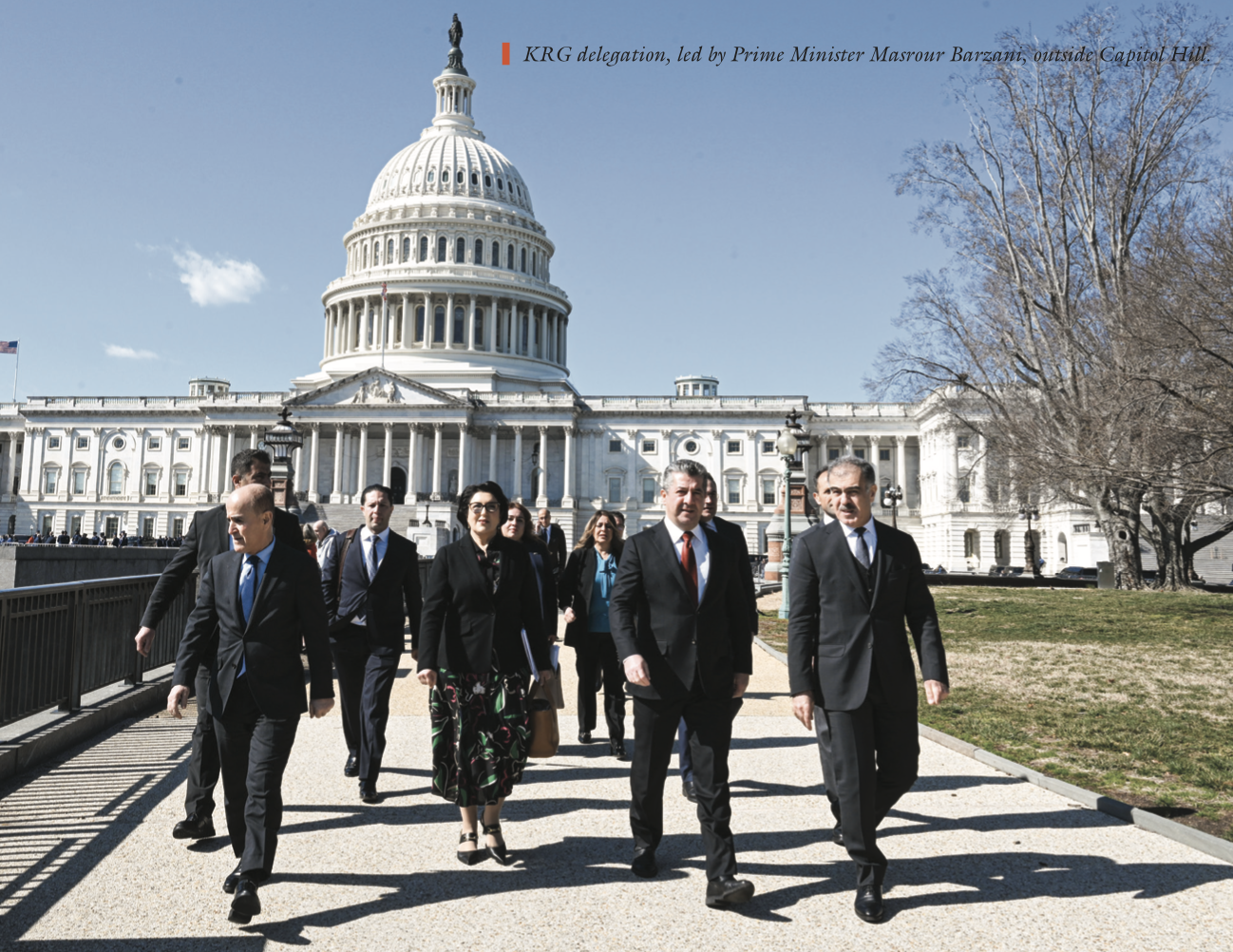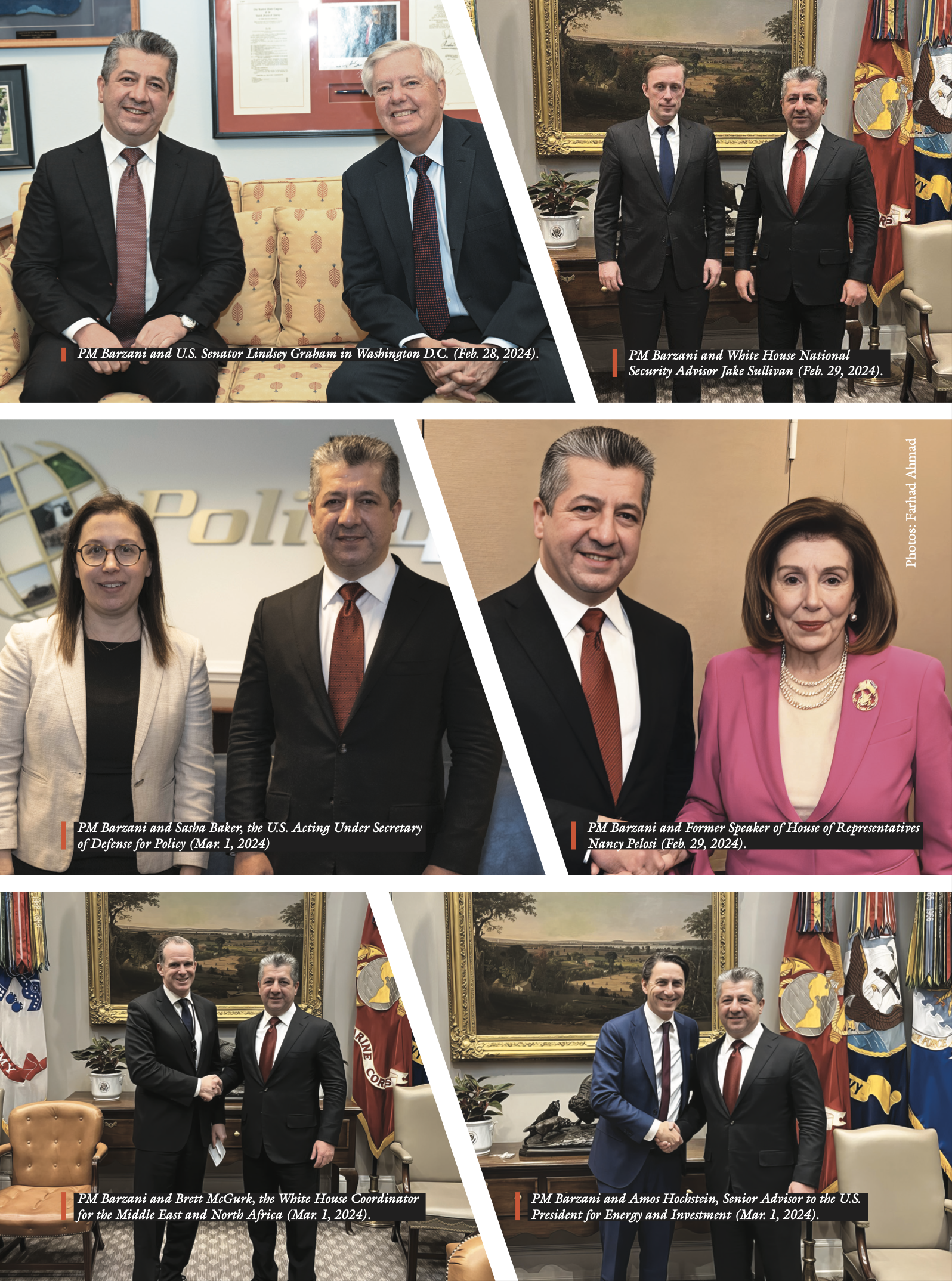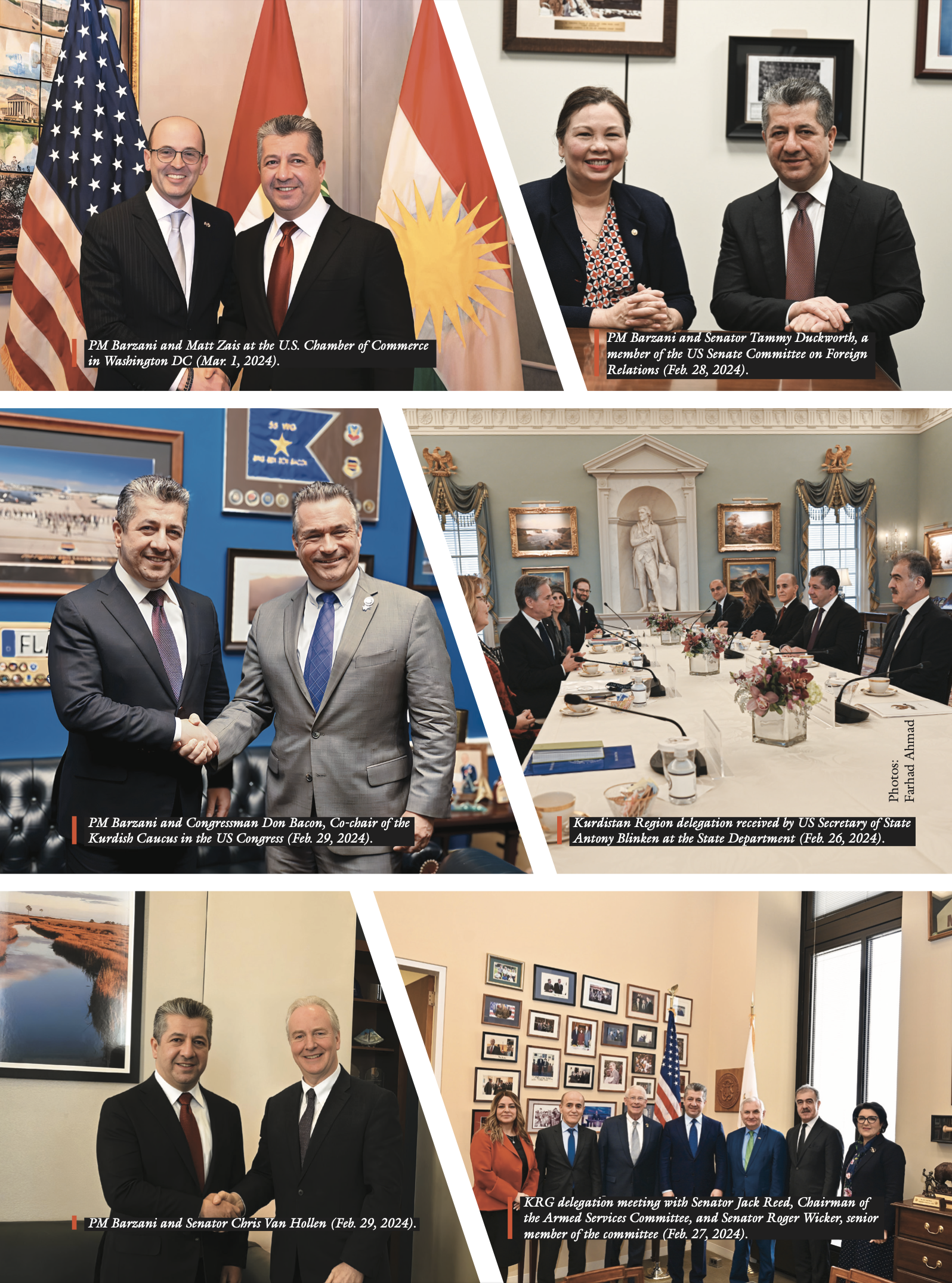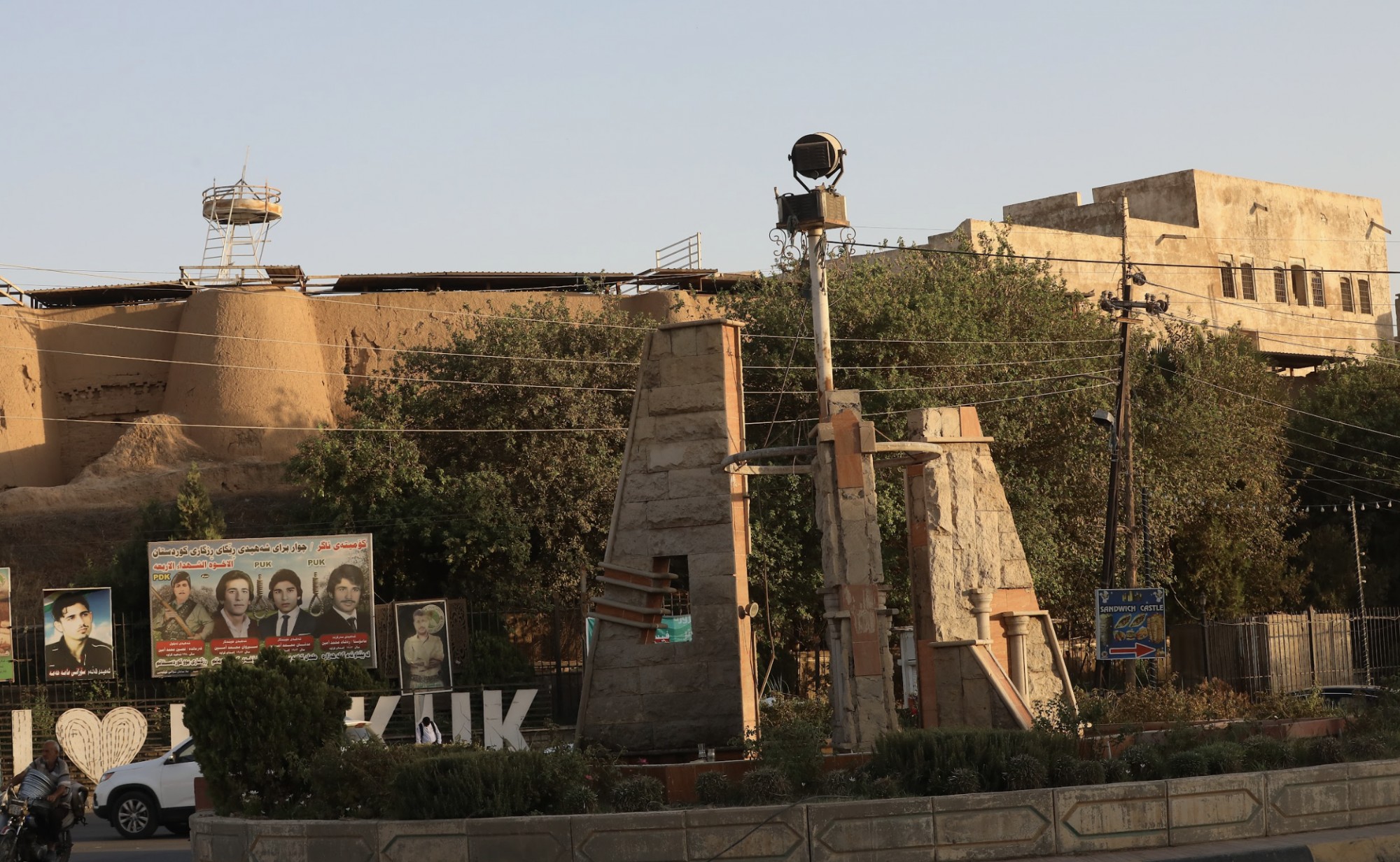Kurdistan Regional Government (KRG) Prime Minister Masrour Barzani’s visit to Washington, D.C. in February 2024, marks a significant moment in the ongoing partnership between the KRG and the United States, highlighting their strategic and multifaceted collaboration. It also underscores the commitment of both parties to reinforce their relationship, focusing on security, economic, and political cooperation. The discussions between Prime Minister Barzani and high-level U.S. officials have aimed to further solidify this friendship, emphasizing a mutual dedication to fostering peace, prosperity, and regional stability.
“Our relationship with the United States remains strong,” KRG Prime Minister Barzani said after the trip, reflecting the sentiment and significance of the visit to Washington, his first in this official role.

Built on past partnerships
In 2005, former KRG President Masoud Barzani made a historic visit to the White House to meet with former U.S. President George W. Bush. The visit was a testament to the burgeoning relationship between the KRG and the United States and set a formal precedent for future cooperation and strategic partnership.
The 2005 meeting between Barzani and Bush also marked a pivotal moment in Kurdish political history, with the United States supporting the security, prosperity, and democratic governance of the region through strategic diplomacy. This foundational engagement established a platform for a lasting partnership, which was further exemplified by current Prime Minister Masrour Barzani meeting with former President Bush while he was in Washington.
Prime Minister Masrour Barzani posted on X: “I was honored to see President Bush during my visit to the United States. I thanked him for his personal support to the people of the Kurdistan Region and Iraq, for liberating Iraq from a brutal dictator, and for backing the democratic process in the country.”
Despite the warm ties, the KRG-U.S. relationship remains deeply dependent upon the Iraqi state and, in the broader context, Iraqi politics. Dynamics between Erbil and Baghdad are crucial to their existence and the wider geopolitical equilibrium of the Middle East. David Romano, Thomas G. Strong Professor of Middle East Politics at Missouri State University, articulated the important nature of Iraqi-Kurdish relations.
“This was the first time that Masrour Barzani has visited Washington as Prime Minister of the KRG, and the visit came at a very worrisome time for the Kurdistan Region. The so-called Federal Supreme Court of Iraq in Baghdad – which was never formed according to provisions in Iraq’s constitution – has been issuing ruling after ruling to undermine the Kurdistan Region’s autonomy, including on election laws, salaries of Kurdistani civil servants, oil, and other issues,” he told Kurdistan Chronicle.

A delicate balance
The timing of Prime Minister Barzani’s visit was particularly noteworthy, as it coincided with increased attention on regional challenges, including the threats posed by Iran-backed militias and the resurgence of ISIS. These security concerns were paramount, especially in the context of protecting U.S. soldiers and ensuring the stability of the region. The visit of Iraqi Prime Minister Mohammed Shia’ Al Sudani to the U.S. capital, scheduled for later in March, is expected to complement these discussions, focusing on critical issues like Iran, the Palestine-Israel conflict, and the overarching security landscape, including the safety of U.S. troops.
“Iraqi Prime Minister Sudani will seek to maintain U.S. support for Iraq without preconditions, at the same time that KRG leaders are calling for U.S. aid to Iraq to be used as leverage to pressure Baghdad to respect Kurdish autonomy and fulfill its constitutional obligations. Sudani must, all the while, balance between the United States and Iran, attempting not to alienate either,” Romano said.
The visits of the Kurdish and Iraqi leaders to the United States signify a concerted effort to address pressing regional challenges through diplomatic channels and strategic alliances. These developments highlight the importance of the Erbil-Baghdad-Washington relationships.
“I’m still not certain that the Biden administration has a foreign policy in the Middle East and particularly Kurdistan. They have short-term objectives, such as preventing a major outbreak of war in the region and avoiding escalation with Iran, but besides that I am not aware of a larger vision or a strategy to achieve it,” Romano said.
The partnership’s security dimension, particularly through cooperation with the peshmerga forces, was instrumental in overthrowing Saddam Hussein and creating stability, as well as in combating ISIS and other ongoing terrorist threats. This collaboration, as noted by Romano, including continued reform efforts, is a cornerstone of the KRG-U.S. alliance.
“I believe the United States will continue to assist the peshmerga in various ways, including salaries, but this aid may see reductions over time. Were the peshmerga to unify under the Ministry of Peshmerga truly and fully, this could change many things for the better. Such unification remains a strong wish of the Americans,” Romano said.
The Kurdistan Region is still not receiving its share of the budget from Baghdad. The KRG faces obstacles in the exportation of oil and has faced unprovoked cross-border attacks. Even the system for reserving quota seats for minority parties within Kurdistan has been struck down. Amid these challenges, Prime Minister Barzani has encouraged the growth of the private sector in Kurdistan.
Steve Lutes, Vice President of Middle East Affairs at the U.S. Chamber of Commerce’s U.S.-Iraq Business Council, told Kurdistan Chronicle that “turbulence across the region” can undermine the confidence of investors and companies that may not already have a strong presence in the Kurdistan Region and Iraq.
“Of course, the visit of Prime Minister Barzani and his delegation was an opportunity to highlight the strong and long-standing alliance with the United States on several fronts. On the economic front, one clear difference from prior visits was the continued shutdown of the Iraq-Turkey Pipeline and the ability to export oil from the Kurdistan Region. Since this has implications for U.S. companies, the Kurdistan Region, and Iraq, with billions of dollars being lost as the challenge continues to linger, we are encouraging stakeholders to take concrete steps to reopen the pipeline and resume oil exports,” Lutes said.

Shared values, interests, and mutual respect
The KRG-U.S. relationship, characterized by shared sacrifices and commitments to democratic principles, is a unique partnership within the turbulent and often politically stagnant Middle East. Prime Minister Barzani’s visit, nearly 25 years after the U.S.-led liberation of Iraq, provided renewed optimism and a glimpse into the future of the relationship.
“In essence, every visit is unique, as circumstances and challenges evolve. This visit by Prime Minister Barzani came at a time when there’s a great deal of turbulence across the region. This has implications for how investors and companies view potential opportunities, as they perceive the security challenges they would face entering the market,” Lutes said.
Moreover, the enduring partnership between the KRG and the United States stands as a beacon of mutual commitment to security, economic prosperity, and democratic values in a region fraught with challenges. Despite the hurdles, such as constitutional disputes with Baghdad and threats to regional stability, the KRG and the United States continue to navigate these complexities through sustained dialogue and cooperation.
The continued strategic collaboration at the highest levels of government is more than a testament to shared interests; it is the foundation upon which the future of the region is being built. As challenges evolve, so too will this partnership. The journey of the KRG and United States serves as a powerful reminder of the transformative power of alliances that are built on shared values, interests, and mutual respect.
Chris Johannes is an international journalist, communications expert, and editor. He has lived in and reported on Kurdish and Iraqi issues since 2016. Additionally, he has worked across the United States, Germany, and the Middle East.

